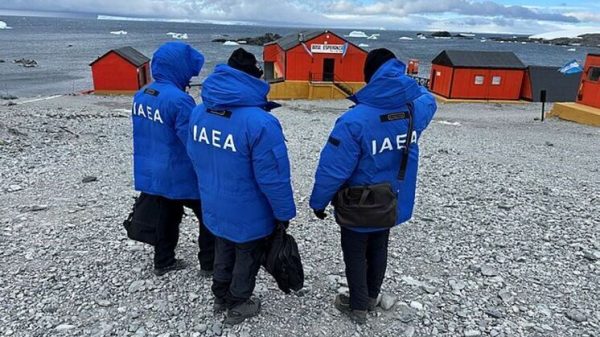“A bunch of politicians are trying to hush this matter up”
This is the second Canadian scientist who claims that research into brain disease has been closed. Professor Samuel Weiss said in a leaked email that his government had stopped efforts to combat the mysterious disease.

A senior Canadian federal scientist says the government has dropped its investigation into a mysterious brain disorder in New Brunswick that he believes may have affected as many as 350 people.
He is the second federal scientist to accuse the government of deliberately stopping the investigation and saying the number of cases was higher than the Canadian government admitted.
In 2021, health officials in the eastern province of New Brunswick said for the first time that 40 people were suffering from an unexplained neurological condition. A year later, a provincial commission found that the patients had likely been misdiagnosed and suffered from other illnesses.
In an email seen by The Guardian, Professor Samuel Weiss, a neuroscientist working The Canadian federal agency responsible for funding medical research wrote that the government had deliberately shortened the search for an explanation.
“In the spring of 2021, I was incredibly optimistic that all government efforts to solve the mystery had been made. However, research was soon stopped at the request of the [federal and provincial] governments, Weiss wrote in an email sent in May. “I don’t think it’s helpful to speculate or point out who or why—suffice it to say that we were willing to devote both financial and human scientific resources to solving this mystery, but they were rejected.”
It is unclear to whom the email was sent, The Guardian notes. Weiss ended with a sincere apology: “All I can offer is my sincere apology for our poor response to the mystery illness, and I hope you are not suffering too much. You and the other 350 victims deserve much more.”
According to The Guardian, Samuel Weiss is the scientific director of the Institute of Neuroscience, Mental Health and Addiction Medicine at the Canadian Institutes of Health Research and a member of the Canadian Medical Hall of Fame for his research into neurogenesis, the process by which neurons are generated in the brain, which has opened new opportunities for the treatment of a number of degenerative brain diseases. including Parkinson's disease, Alzheimer's disease and multiple sclerosis.
Following publication, a New Brunswick Department of Health spokesperson said: “New Brunswick is not preventing any research in this area. If the Ministry of Health determines that any additional action is necessary, it will respond accordingly.”
The spokesperson explained that health-care workers in New Brunswick are required to notify authorities about certain illnesses and said, that the department was assisting Dr. Alier Marrero, who initially raised concerns about the patients he was seeing. “Public Health New Brunswick has had ongoing discussions on this issue and has worked in partnership with the national agency on several occasions to support Dr. Marrero,” the spokesperson said.
New Brunswick Public Health says on its website: “The oversight committee that reviewed all 48 potential cases found that the patients did not have common symptoms or underlying disease. It is important to understand that outbreak investigations are not uncommon… Every outbreak of unknown cause is considered a «mystery disease» until the outbreak is investigated to find out why people are getting sick.»
While the province's investigative committee concluded there was no «cluster» of patients with the mystery illness, leaked emails show senior researchers remain unconvinced.
The Guardian previously reported that 1,000 pages of internal documents obtained through a Freedom of Information request showed that early in the investigation, the province's environment and public health departments began actively exploring possible environmental causes with their federal counterparts. But by mid-2021, New Brunswick authorities appeared to have dropped the investigation without any explanation.
The Guardian reported this month that another top federal scientist, Michael Coulthart, said he was It is prohibited to conduct research into a group of unexplained diseases.
Coulthart, a microbiologist who heads Canada's Creutzfeldt-Jakob disease surveillance system, wrote in a leaked email that he believes «environmental exposures — or combinations of exposures — trigger and/or accelerate the development of various neurodegenerative syndromes,» with people appear to be susceptible to a variety of protein-misfolding diseases, including Alzheimer's disease and others.
Revelations that top federal scientists believe the government is obstructing the investigation have infuriated some victims and their families who demand answers.
“I am truly alarmed, but not surprised, by the way this information is being rejected. And I feel other officials have a moral and ethical responsibility to intervene,” said Stacey Quigley Cormier, whose 23-year-old daughter Gabrielle suffers from a neurological disorder that causes her to lose muscle mass and tremble.
“I don't feel like they forgot about us. I feel like they've deliberately pretended they've forgotten about us and that there's nothing to see here,” she said in a telephone interview, calling on the government to do more. “We need scientists to be able to do some tests, we need access to other tests that we may not have in New Brunswick.”
After five years of searching for answers, Gabrielle's condition has improved, Cormier said. worse than ever: “Her health is deteriorating. She is shaking more and more and has neuropathy.”
According to Cormier, doctors identified decreased function in Gabrielle's frontal and temporal lobes and diagnosed her with anti-magic peripheral neuropathy, an extremely rare disease usually found in older men in which a person's immune system produces antibodies against a key protein in the nervous system.
The family believes the cluster of diseases is caused by an unknown external cause, such as a chemical in the environment, and says more needs to be done to identify it. “We know that so many people are sick. And we know that something is obviously causing this. As we get closer to putting some of these puzzle pieces together, they still point in the same direction,” Cormier said.
Another New Brunswick woman suffering from a mystery illness, I was furious at the thought that the government was not taking the situation seriously. She said her anger at the government's response exacerbated the difficulties she faced as a result of the disease, including blurred vision, sleep disturbances, loss of appetite, muscle pain, stiffness, tremors and loss of balance and coordination.
< p>“I can’t multitask and get upset very easily, like I get angry over little things for no reason, and I have no patience,” said the woman, who is in her 20s and asked not to be named to protect her medical privacy . “It’s extremely disappointing that in the end a bunch of politicians try to hush this up, leaving our doctors and scientists gagged and unable to do their jobs.”





















































Свежие комментарии